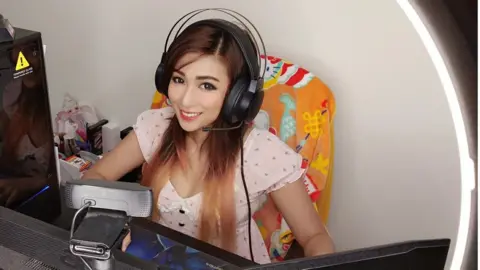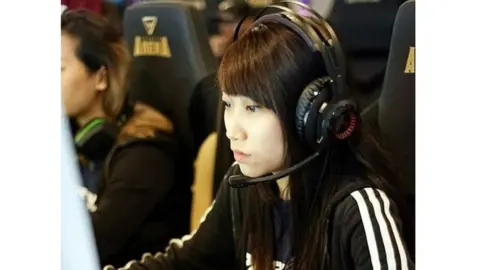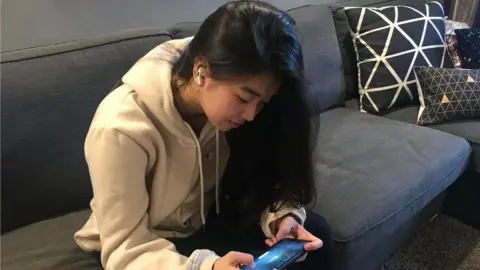Female gamers are on the rise in the 'world capital of gaming'
 Reia Ayunan
Reia AyunanThe number of females playing video games in Asia is growing at a faster rate than their male rivals, according to the latest research.
Women are levelling the playing field across all of Asia's key markets including China, India and Japan.
The female video gaming community grew by 19% last year, according to data commissioned by Google.
Asia is regarded as the global capital of video games, accounting for 48% of the world's total gaming revenue.
"Among the millions of gamers joining the ranks every year, females have been a huge catalyst for growth," said Rohini Bhushan, at Google Asia Pacific.
There are a number of factors that are contributing to this rise, with storylines becoming more inclusive and connectivity improving across the region.
For 2019, the numbers of female gamers had grown to 38% of the 1.33bn Asian gaming population, according to Google which collaborated with market researchers Niko Partners.
For China, they now account for 45%, while for South Korea, Japan and Southeast Asia the figure is 40%.
Money spinners
The region has seen particularly strong growth in gamers using mobile phones.
"More and more female gamers are drawn to the fun, flexibility and freedom that mobile gaming affords. This is especially the case in Asia, where mobiles are the primary internet-enabled device for many people," said Matt Brocklehurst, head of apps, partnerships and platform marketing, Google Asia Pacific.
Gaming has become extremely lucrative, not just for companies like EA and Activision Blizzard who make the games, but also for the best players in e-sports - competitive online gaming.
Top female e-sport players are now seen as key influencers with millions of followers who watch them play online via live-streaming.
 Amanda Lim
Amanda LimIn Asia, entire teams and leagues made up of female gamers are now making an impact on the world stage, including the Female Esports League, a regional gaming circuit to help boost female representation in esports.
Last year, mobile communications firm Singtel provided sponsorship to the league.
"We aim to raise the visibility of female gamers and support their professional growth as part of our efforts to create a more inclusive environment, and enable everyone to come together and pursue their passion for gaming," said Singtel's Cindy Tan.
Professional gamer Amanda Lim, 25, got into online video games as a way to bond with her brother and uncle. "That's when I fell in love with gaming. Female gamers are less well-known but I think in time that will change as more of us start playing. We can be as strong as males."
Ms Lim plays for an all-female team called We.Baeters, who are spread across Malaysia and Singapore.
'Not the target demographic'
Ex-professional gamer, Reia Ayunan, typically played role-playing and Battle Royale games for around six hours a day.
Her live stream was made up of viewers from the Philippines, Malaysia and Indonesia.
She has noticed more female players live-streaming online. "While there are some leagues working towards equality in the pro scene, society still assumes that women/girls don't like playing video games, therefore we're not the target demographic of the gaming industry."
As a professional gamer she was earning SG$4,000 (£2,300; $2,800) a month, mostly from sponsors. She was recently hired by video game creator Ubisoft and now produces game content aimed at attracting more females.
 Valerie Ong
Valerie OngStudent Valerie Ong, 19, lives in Singapore and plays between three and seven hours a day, depending on if she is at school or on a term break.
She started playing Call of Duty (CoD) after she went to support her best friend at a national competition earlier this year. "It was a real eye-opener as it was heavily male-dominated and my friend was actually the only girl that competed.
"It was really cool and inspirational to watch her play as she could outplay many of her opponents and actually carried her team in many matches."
The social aspect also appeals to Valerie as gamers can play with others from across the world. "I play with other people online which makes it super fun as we can joke around with one another while playing," she added.
Unfortunately, there is a dark side to the rise of females gamers as many have been harassed online. "I was turned into memes and even was a victim of sexual harassment online. Once you go public and you get noticed there will always be people hating on you, finding faults and mistakes. The gaming community can be very toxic," added Ms Ayunan.
Experts advise choosing a username that doesn't include your real name or other identifying information when creating accounts and profiles.
